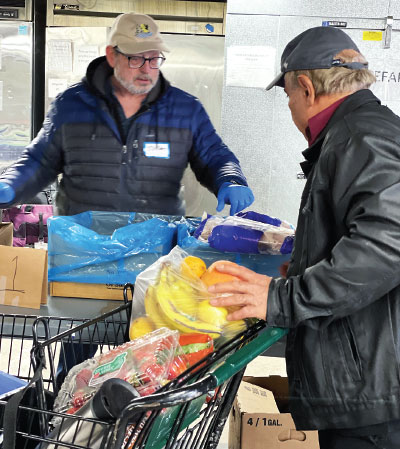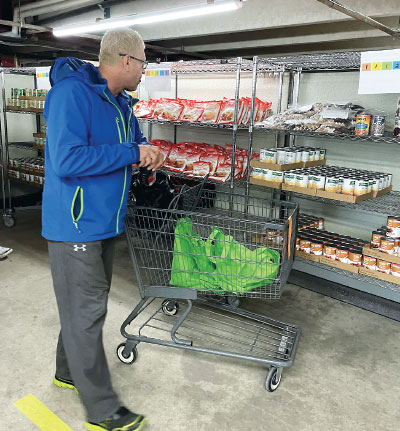Food Insecurity, MH Inextricably Linked, Experts Say
Abstract
Every five years, the farm bill that authorizes federal nutrition programs like SNAP is up for debate before it expires in September. SNAP is a lifeline for people experiencing food insecurity, which is a social determinant of mental health that is too often neglected.
When clients reach out to Jewish Family Service in Denver for help finding food, their need and the impact food insecurity has had on them are often evident. It may be their visible weight loss or sometimes a deterioration in the way they present themselves such as in their appearance or demeanor, explained Elizabeth Lawrence, director of community resources for stability at Jewish Family Service.

Two volunteers with Jewish Family Service in Denver stock up the organization’s food pantry.
“We have a unique lens, because we see the aftereffects, too,” Lawrence said. “We see the happier end of it, when folks who had been food insecure are really stocking up at one of our mobile pantries because they’re trying to ensure they can make it through until they get resources again. You see their demeanor shift, again, when people who had to skip several meals start to realize they don’t have to worry quite as much as they did before.”
Jewish Family Service provides a variety of services, helping its clients address food and housing insecurity, access mental health care, and more. According to Lawrence, over the past several months the need for support in finding food has quadrupled, reaching the levels that the organization saw at the height of the COVID-19 pandemic. Myriad factors are driving that need, she said, but one of them is the end of the expanded Supplemental Nutritional Assistance Program (SNAP) benefits that were introduced during the pandemic. In March, the emergency SNAP allotments that households received during the pandemic ended.
According to experts like Michael T. Compton, M.D., M.P.H., food insecurity is a driver of mental health problems that requires the attention of mental health professionals. Psychiatrists and other professionals are accustomed to screening for, evaluating, and addressing other social determinants of mental health, such as adverse childhood experiences, unemployment, and housing instability. But food insecurity and nutrition-related issues are rarely included when assessing patients during routine psychiatric evaluations, said Compton, a professor of psychiatry at Columbia University Vagelos College of Physicians and Surgeons. He has written extensively on food insecurity as a social determinant of mental health.
“Food insecurity causes chronic stress, which, like other forms of chronic stress, can lead to physiological stress responses that increase risk for depression,” Compton said. “Food insecurity caused by constrained financial resources can also impact one’s ability to adhere to treatments and engage in illness self-management and, thus, recovery.”
Food Insecurity Long Linked To Poor Mental Health
At Jewish Family Service, people seeking help for food or housing insecurity are quite often linked to the organization’s mental health services as well, Lawrence said. What she and her colleagues see daily is also backed up in literature around food insecurity and mental health.
For example, a 2021 article published in BMC Public Health measured the impact of food insecurity on mental health during the early days of the COVID-19 pandemic. The investigators surveyed 2,714 low-income Americans and found that food insecurity was associated with a 257% higher risk of anxiety and a 253% higher risk of depression. Comparatively, losing a job was associated with a 32% increased risk of anxiety and 27% increased risk of depression.

A volunteer with Jewish Family Services in Denver checks the stock in the organization’s food pantry.
A 2020 review published in Current Nutrition Reports looked at studies published in the previous five years and identified “a significant and positive association between food insecurity and psychological distress” among the populations included in the studies, such as adults, adolescents, young adults, college students, individuals with chronic disease, and parents. Some of the included studies also found that “SNAP played a buffering role in the relationship between food insecurity and psychological distress.”
“We know from decades of research that food insecurity is associated with poor health outcomes, both for physical and mental health,” said Hilary Seligman, M.D., M.A.S., a professor at the University of California, San Francisco, in the Department of Medicine and founder of EatSF, which provides healthy food to low-income individuals. “There are also data showing that it is bidirectional, meaning that it is true that coping with food insecurity is very stressful and likely exacerbates psychiatric illnesses. But it is also very true that, as people become more ill whether from a physical or mental illness, their capacity to maintain steady employment goes down, household budgets come under more pressure, and they are more likely to become food insecure. It’s a vicious cycle.”
SNAP’s Vital Role in Fighting Food Insecurity
SNAP can be a lifeline for many families and individuals experiencing food insecurity, Seligman said. It is authorized in the farm bill, which Congress reconsiders and approves every five years. The 2018 Farm Bill expires at the end of September. Compton said he considers the farm bill to be a mental health law because of the huge impact that food insecurity has on mental health.
Seligman said the possibility of expanding SNAP benefits in the farm bill is low. As Congress debates the national debt limit, SNAP has been placed on the bargaining table with proposals to increase the number of people who receive SNAP and are subject to work requirements.
But even with the prospect of expanded SNAP benefits unlikely, Seligman pointed out that there is still the opportunity to make incremental improvements to the way SNAP is administered, which could help huge numbers of people. Already, some improvements have been made. In 2021, the U.S. Department of Agriculture (USDA) released a re-evaluation of the Thrifty Food Plan, which is used to calculate SNAP benefits. That re-evaluation meant that the average SNAP benefit (excluding funds provided as part of pandemic relief) increased by $36.24 per person per month.
Seligman pointed out that, although SNAP beneficiaries faced a hunger cliff when their pandemic-era relief ended, the cut was not as much as it would have been before that re-evaluation.
“We haven’t lost the game,” Seligman said. “There are a lot of opportunities to reach people who are experiencing food insecurity, and a lot of levers at the federal, state, and local levels that can be pulled. We haven’t pulled all those levers. There’s a lot we can still do, and we can still make a substantive difference.”
Support Necessary Band-Aids to Food Insecurity
Compton emphasized the need for mental health professionals to play a role in addressing food insecurity by advocating for federal and state policies related to food and nutrition and promoting food banks. He also pointed to the need to address food insecurity in clinical settings through screening, assessment, treatment, and follow-up.
“Given the high rates of food insecurity among our patients—especially among those with serious mental illnesses—screening for food insecurity is imperative, as is asking additional questions for evaluation and making appropriate referrals to resources,” he said.
SNAP is the first line of treatment for food insecurity, Seligman said, and ensuring eligible patients are enrolled in SNAP, or other nutrition assistance programs such as WIC for pregnant or postpartum patients, is vital.
Helping patients through the complex task of signing up for government programs and connecting them with other resources are also important, Lawrence said. “These systems can be really tricky,” she said. Some people get assistance from their case workers or organizations like Jewish Family Service to help them understand what they qualify for and how to get benefits, but many fall through the cracks.
“It takes familiarity with these systems to navigate them and advocate for yourself,” she said. “Just one thing, like filling out just one line on paperwork incorrectly, can disqualify them for benefits.
“People who are already experiencing crisis situations are in survival mode, and we’re asking them to go through complicated administrative processes that frequently require quite a bit of follow up,” Lawrence continued. “Sometimes that’s just not an option for them, and that’s when we see people not getting services, even though they’re eligible for them.”
For those patients who are enrolled in federal nutrition programs but are still experiencing food insecurity, there are other programs set up across the United States they can turn to, Seligman said. These programs include produce prescription programs, which are gaining momentum across the country, and food pantries, which Seligman described as “a really important line of defense for food insecure households that aren’t eligible for other programs.”
All these options, Seligman said, are Band-Aids. “Yet they are critical Band-Aids,” she said. “We have to invest in Band-Aids right now because we don’t have structural solutions that are close to being implemented. If we don’t execute on our Band-Aid solutions, we risk leaving behind an entire generation of people. And that’s too big of a risk.” ■



